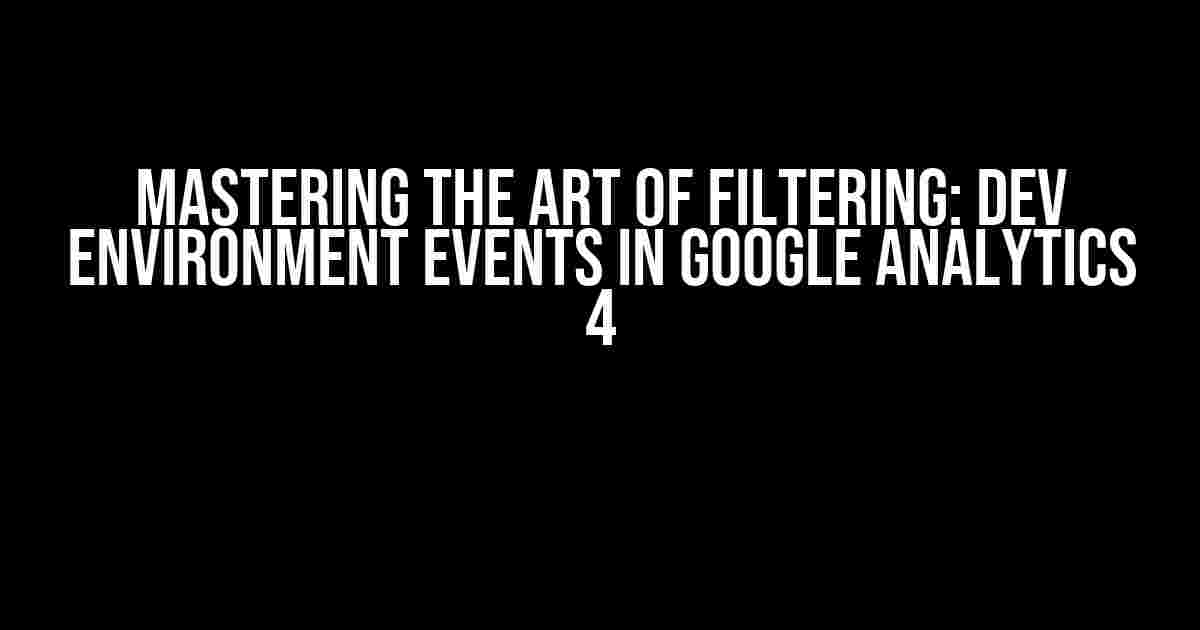Are you tired of cluttered event reports in Google Analytics 4 (GA4), making it difficult to analyze your dev environment events? Do you want to streamline your analytics setup and focus on the data that truly matters? Look no further! In this comprehensive guide, we’ll walk you through the process of filtering dev environment events in GA4, ensuring you get the most out of your analytics data.
Why Filter Dev Environment Events?
Before we dive into the nitty-gritty, let’s discuss why filtering dev environment events is crucial. Your dev environment is where you test new features, experiment with code, and iron out bugs. However, this testing can generate a substantial amount of noise in your analytics data, making it challenging to separate meaningful events from irrelevant ones.
By filtering dev environment events, you can:
- Reduce clutter in your event reports, making it easier to analyze and gain insights.
- Prevent skewed data from affecting your decision-making process.
- Improve the overall performance of your analytics setup.
Understanding GA4 Filtering
GA4 provides a robust filtering system that allows you to control what data is processed and what is excluded. There are two primary types of filters in GA4:
- Include Filters: These filters specify what data should be included in your reports.
- Exclude Filters: These filters specify what data should be excluded from your reports.
In the context of dev environment events, we’ll focus on creating exclude filters to remove irrelevant data from our reports.
Creating a Dev Environment Filter
To create a dev environment filter, follow these steps:
- Go to your GA4 property and navigate to
Configure>Data Streams. - Click on the
Editbutton next to your data stream. - Scroll down to the
Filterssection and click onNew Filter. - Choose
Excludeas the filter type. - Name your filter (e.g., “Dev Environment Events”).
- Set the
Filter Typeto .
Filter Type: Event Filter Name: Dev Environment Events
Defining Filter Conditions
Now, it’s time to define the filter conditions. You can use various parameters to specify what events should be excluded. For dev environment events, you can use the following conditions:
Event name contains _dev_:
Event Name: Contains _dev_
or
Device category is Desktop and User ID is dev_team_member:
Device Category: is Desktop AND User ID: is dev_team_member
You can add more conditions as needed, depending on your specific use case.
Applying the Filter
Once you’ve defined the filter conditions, click Apply to save the filter. GA4 will now exclude events that match the specified conditions from your reports.
| Before Filtering | After Filtering |
|---|---|
|
|
In this example, the dev environment filter excludes events with names containing _dev_, resulting in a clean report with only relevant production events.
Best Practices for Filtering Dev Environment Events
When creating filters for dev environment events, keep the following best practices in mind:
- Use specific filter conditions: Avoid using broad filters that might exclude important events. Instead, focus on specific conditions that target your dev environment events.
- Test your filters: Verify that your filters are working as intended by checking your event reports.
- Maintain filter organization: Keep your filters organized by naming them descriptively and using a consistent naming convention.
- Review and update filters regularly: As your dev environment evolves, review and update your filters to ensure they remain effective.
Conclusion
Filtering dev environment events in Google Analytics 4 is a crucial step in maintaining a clean and accurate analytics setup. By following the steps outlined in this guide, you’ll be able to create effective filters that exclude irrelevant data, providing you with a clearer understanding of your production environment events.
Remember to stay vigilant and adapt your filters as your dev environment evolves. With a well-maintained filter system, you’ll be able to focus on what truly matters – making data-driven decisions to drive your business forward.
Happy filtering!
Here are 5 Questions and Answers about “Filtering dev environment events Google Analytics 4” in HTML format:
Frequently Asked Question
Get the answers to your burning questions about filtering dev environment events in Google Analytics 4!
What is the purpose of filtering dev environment events in Google Analytics 4?
The purpose of filtering dev environment events in Google Analytics 4 is to exclude internal traffic and testing data from your analytics reports, ensuring that your data is accurate and reflects real user behavior.
How do I identify dev environment events in Google Analytics 4?
You can identify dev environment events by looking for events triggered from your internal IP addresses, specific user agents, or custom dimensions that indicate testing or development activity. You can also use Google Analytics 4’s built-in features, such as the “Internal traffic” filter, to automatically exclude internal traffic.
What are the benefits of filtering dev environment events in Google Analytics 4?
Filtering dev environment events in Google Analytics 4 provides several benefits, including more accurate data, reduced noise in your reports, and improved data quality. This also helps you focus on real user behavior and make data-driven decisions with confidence.
Can I create custom filters to exclude dev environment events in Google Analytics 4?
Yes, you can create custom filters in Google Analytics 4 to exclude dev environment events. You can use the “Filters” feature to create rules that exclude specific events, traffic sources, or user agents. This allows you to tailor your filtering to your specific development environment and testing requirements.
How do I verify that my dev environment events are being excluded from Google Analytics 4 reports?
You can verify that your dev environment events are being excluded from Google Analytics 4 reports by checking your reports and filters. Look for a decrease in events and sessions from your internal IP addresses or user agents, and ensure that your filters are applying correctly. You can also use the Google Analytics 4 Debugger to test and validate your filters.
